Balloon Angioplasty and Stenting for Aortic Coarctation treatment in Germany
Treatment prices are regulated by national law of the corresponding countries, but can also include additional hospital coefficients. In order to receive the individual cost calculation, please send us the request and medical records.
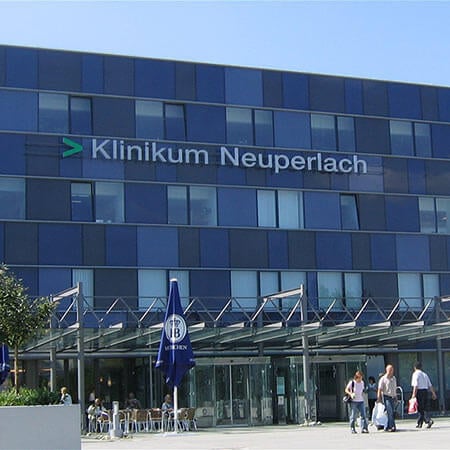
Department of Cardiology and Pulmonology
The Department of Cardiology and Pulmonology provides the full range of diagnostic and therapeutic services for patients with diseases of the cardiovascular system and lungs. In the field of cardiology, key attention is paid to the treatment of valvular heart disease, arrhythmias, heart failure, coronary artery disease, arterial hypertension and aortic diseases. The department's pulmonologists mostly deal with the treatment of pneumonia, bronchial asthma and chronic obstructive pulmonary disease. In addition, the department operates an Intensive Care Unit, within which patients can receive artificial ventilation, renal replacement therapy and procedures for maintenance of blood flow. The department's Chest Pain Unit is certified by the German Cardiac Society and provides medical care to patients with acute coronary syndrome. The department successfully uses in its clinical practice both proven classical treatments and innovative medical achievements, which are available only in leading European hospitals. The department's medical team provides treatment to more than 3,200 patients every year.


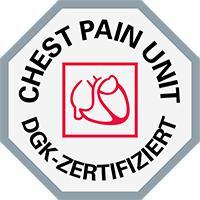
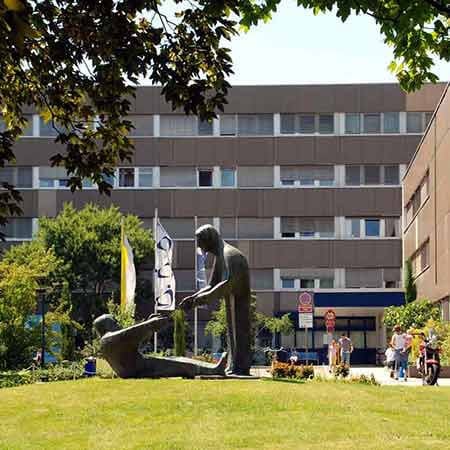
Department of Cardiology and Angiology
The Department of Cardiology and Angiology offers the full range of medical services in the fields of its competence. The department's doctors specialize in the treatment of congenital and acquired heart defects. The key focus is on catheter-based heart interventions, which are characterized by a minimal trauma rate and allow patients to avoid an open operation. For this purpose, the department has three modern Cardiac Catheterization Laboratories. The department also houses an Intensive Care Unit and a Chest Pain Unit for patients with acute coronary syndrome. The medical facility has 82 beds. The department was awarded the prestigious quality certificate from the German Cardiac Society (DGK) for outstanding results in the treatment of mitral valve diseases and acute coronary syndrome. Another important area of work of the department's physicians is comprehensive heart examinations for the prevention of heart disease. For this purpose, specialized Check Up Programs have been developed here, which include an optimal set of diagnostic tests. The medical facility employs a highly professional team of doctors and nursing staff, which makes every effort to provide each patient with effective medical care in a pleasant and comfortable atmosphere.
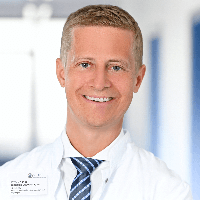

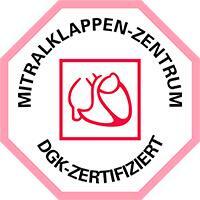
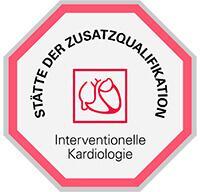


Department of Cardiology and Angiology
The Department of Cardiology and Angiology offers the full range of medical services in the areas of its specialization. The medical facility holds consultations and carries out the diagnostics and treatment of diseases of the heart and blood vessels. The department's team of cardiologists focuses on patients with valvular heart disease, heart rhythm disturbances, coronary artery disease, heart failure, and congenital heart disease. The department has a Chest Pain Unit certified by the German Cardiac Society (DGK) for the treatment of acute coronary syndrome. In the field of angiology, of key interest is the treatment of peripheral arterial occlusive disease, vascular stenosis of various locations, including carotid artery stenosis, and deep vein thrombosis. During the treatment of diseases of the heart and blood vessels, the department’s specialists use various drug therapy regimens and perform image-guided interventional procedures. The medical facility has been recognized with quality certificates for transcatheter aortic valve implantation (TAVI) and treatment of heart failure and mitral valve disease. Patients are treated by highly qualified physicians who strive to restore the patient's health using sparing treatment methods.
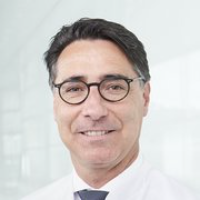





Aortic coarctation is a critical heart disease that requires treatment in childhood. A relatively mild "adult" type of the defect is less common. It may not be diagnosed in time and cause complications in patients between the ages of 20 and 30. The main treatment for coarctation of the aorta is surgery, but treatment in Germany can also be carried out using a minimally invasive procedure, namely balloon angioplasty and stent implantation. The procedure is used mainly in adult patients, while it is an uncommon option in children. You are welcome to use the Booking Health website to find out the cost of treatment in Germany and compare prices at different German hospitals.
Content
- Methods of transcatheter treatment of aortic coarctation
- Who may be a candidate for endovascular treatment of aortic coarctation?
- How is the procedure for aortic coarctation performed?
- Advantages of this treatment method for aortic coarctation
- Benefits of treatment in Germany for aortic coarctation
Methods of transcatheter treatment of aortic coarctation
There are two transcatheter interventions for the treatment of aortic coarctation. These are balloon angioplasty and stenting. Balloon dilatation involves positioning a deflated balloon at the site of a narrowed blood vessel and then inflating it. This stretches the inner and middle layers of the aorta. This procedure carries the risk of causing damage to the aortic wall and, in some cases, may lead to the formation of an aneurysm.
Stenting in the coarctation area has advantages over balloon dilatation, including less risk of damage to the aortic wall and more reliable results in repairing aortic coarctation. The stent is a frame that holds the lumen of the blood vessel open.
Who may be a candidate for endovascular treatment of aortic coarctation?
Basically, endovascular treatment of aortic coarctation can be performed in the following cases:
- recurrent coarctation of the aorta (recurrent development of coarctation after previous surgical treatment);
- primary treatment of coarctation of the aorta in adult patients.
In recent years, the technique has been introduced into pediatric cardiac surgery, but its widespread use is hampered by several problems: too large stent delivery devices, the high rate of recurrent coarctation in young children, and the discrepancy between the diameter of the stent and the size of the aorta. The aorta grows in children, but the stent remains the same. As a result, additional endovascular procedures to expand the stent have to be performed.
The procedure for the treatment of coarctation of the aorta abroad is, however, sometimes performed even on newborn patients, for example, if open surgery is too risky due to the child's weakened condition. In such a case, balloon angioplasty for patients may be performed as a palliative procedure. After it, recurrent coarctation is highly likely to occur, and the younger the child, the higher the risk of recurrent narrowing of the aorta. Nonetheless, the patient's condition will have stabilized by this time, and doctors will be able to perform a surgical intervention to treat heart disease.
In young children, balloon angioplasty is mostly performed without any stenting. The placement of stents, due to the significant size of the delivery devices, has an increased risk of femoral vein thrombosis.
In recent years, the procedure has become more popular among children over the age of ten. It is possible to implant adult-sized stents that do not need to be expanded in the future.
Even at the age of ten, balloon angioplasty and stenting are technically possible. However, in this case, it will be necessary to carry out a revision procedure in the future to expand the stent due to an increase in the diameter of the aorta.
Endovascular treatment is only suitable for patients without any concomitant aortic arch hypoplasia and other heart diseases. The technique can also not be used if the coarctation area is very extensive.
How is the procedure for aortic coarctation performed?
The technique of stenting with balloon angioplasty depends on the patient's age and the equipment used. In any case, this is a minimally invasive manipulation that is performed through an incision in the groin. Any incisions in the chest are not required. The procedure is performed under local anesthesia in adult patients and under short-term, safe intravenous anesthesia in children, without tracheal intubation.
Doctors perform a puncture of the common femoral artery on the right, after which a transfemoral introducer is inserted into it. Heparin is given to prevent blood clots. Aortography is then performed, which is a contrast-enhanced X-ray scan of the artery. The exact size of the narrowing site is estimated, and the pressure drop is measured.
On a rigid guidewire, the introducer is changed to a stent delivery system. The guidewire and the delivery catheter deliver and position the stent at the isthmus of the aorta, which is mounted on a BIB balloon (Balloon in Balloon). The inner balloon is inflated. Coronary angiograms are then performed to assess its positioning. The outer balloon is expanded after that.
In young children, balloon angioplasty and stenting for aortic coarctation may be performed as two separate procedures.
Advantages of this treatment method for aortic coarctation
Compared to open surgery, balloon angioplasty and stent implantation are less traumatic methods. They have a lower risk of complications. The elimination of coarctation with proper patient selection is carried out no less effectively and reliably than when using an open surgical intervention.
Following angioplasty, patients recover quickly. The duration of the hospital stay is only a few days, and rehabilitation is not required. The aesthetic result of the treatment is better because there are no large scars on the chest. The technique is applicable even in patients at high surgical risk who have contraindications to open surgery, for example, due to severe mitral regurgitation, ventricular dysfunction, or concomitant diseases of other organs.
Benefits of treatment in Germany for aortic coarctation
You can undergo your treatment in Germany for aortic coarctation with balloon angioplasty and stent implantation. There are a few reasons for you to seek medical attention at one of the German hospitals. These are the following:
- treatment in Germany using an endovascular technique is carried out in modern medical centers equipped with state-of-the-art technology;
- doctors have vast and successful experience in such procedures;
- coarctation of the aorta in childhood can be treated using endovascular techniques;
- angioplasty for coarctation of the aorta can be performed even in newborns, if required;
- the latest models of stents are implanted;
- a low risk of complications;
- reliable results in the treatment of aortic coarctation with a minimal risk of the need for revision procedures or operations in the future.
You can find out the cost of treatment in Germany and choose a medical care program at the best price through the Booking Health website. Our website presents the best German hospitals. When you make your appointment through Booking Health, the cost of treatment in Germany will be lower for you than when you contact a German hospital directly. Prices are reduced due to the absence of high taxes for foreign patients. In addition, you can be sure that the initial cost of treatment in Germany will not increase after the start of your medical care program. You will receive insurance that will cover unforeseen medical expenses.
The Booking Health specialists will take care of all the arrangements for your treatment in Germany. We will help you select the best German hospital, contact its administration, and schedule an appointment for your preferred dates. We will also translate your medical documents into German, purchase airline tickets, and book a room for you in the hotel closest to the German hospital. Our company's employees will meet you at the airport and take you to the hospital by car. After the completion of your treatment in Germany, we will also organize your return transfer.
Authors:
The article was edited by medical experts, board-certified doctors Dr. Nadezhda Ivanisova and Dr. Vadim Zhiliuk. For the treatment of the conditions referred to in the article, you must consult a doctor; the information in the article is not intended for self-medication!
Sources:
European Society of Cardiology

